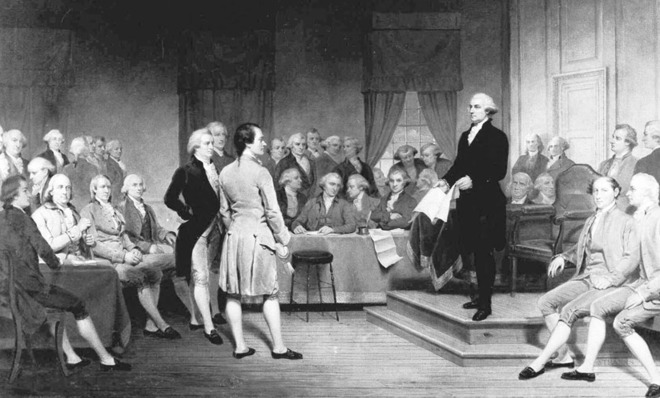The myopic folly of demanding a new constitutional convention
Our government often seems bumbling, corrupt, and wasteful. But it could be worse. Much worse.


A free daily email with the biggest news stories of the day – and the best features from TheWeek.com
You are now subscribed
Your newsletter sign-up was successful
Americans have a thing for starting over. We love the idea of breaking from the past, beginning from scratch, getting a new life, setting out on a fresh path.
No wonder, then, that some of us seem to be taken with the idea of solving our political problems by calling a constitutional convention to craft a new founding document — one that is less… well, it sort of depends on what you find intolerable about the present system.
Conservatives spend their days dreaming of a balanced budget amendment, term limits for Supreme Court justices, and special protections for the free enterprise system.
The Week
Escape your echo chamber. Get the facts behind the news, plus analysis from multiple perspectives.

Sign up for The Week's Free Newsletters
From our morning news briefing to a weekly Good News Newsletter, get the best of The Week delivered directly to your inbox.
From our morning news briefing to a weekly Good News Newsletter, get the best of The Week delivered directly to your inbox.
Libertarians worry about ever-expanding executive power.
Liberals agonize over the influence of wealthy special interests on all branches of government.
Centrists fret about generalized governmental dysfunction and the danger that it will lead to the kind of breakdown that we've seen in presidential democracies throughout the developing world.
I have sympathy for a number of these complaints, especially the ones highlighted by the liberals and centrists. But that doesn't mean calling a constitutional convention is a good idea. On the contrary, it's an atrocious idea — and one that would be likely to make our very real problems far worse.
A free daily email with the biggest news stories of the day – and the best features from TheWeek.com
This isn't just an academic exercise. Last April, Michigan became (by some counts) the 34th state to endorse a constitutional convention. That's two-thirds of the states, meaning that under Article V of the Constitution, such a convention could arguably be called at any time.
Now it's true that most of these states have voted to convene a convention not because they want to scrap the Constitution and start over completely. Instead, they're proposing to use a convention to draft and approve various amendments to the current constitution. The Constitution stipulates two methods of amendment. The first is the method that's been used for all 27 amendments so far, which involves a two-thirds vote in both the House and Senate before the resolution is sent to the states for ratification. The other, which has never been used, requires that a convention be convened.
So why not hold a convention?
For one thing, because many jurists and constitutional scholars contend that once such a convention is convened, its agenda and scope cannot be controlled. For the first time since 1787, the fundamental law of the United States would be up for debate from top to bottom.
But with our political system suffering from so many maladies, why should that worry us? Perhaps we should take advantage of the opportunity to restructure the Constitution in a more essential way. Maybe we'd be better off with a parliamentary system of government, including more proportional representation. Maybe we should welcome an electoral system that promotes the growth and proliferation of parties, encourages them to form coalitions, removes some of the veto points that increasingly paralyze our politics, and ties executive power more closely to the legislative branch of government.
If it truly were possible to start over from scratch, with some extra-political lawgiver poised to bequeath a new Constitution more suitable to modern America, then maybe this would be an appealing prospect. But of course that isn't possible. There is no such savior waiting beyond the political fray to ride to our rescue.
And that means that any constitutional convention would reflect the same fractiousness and embody the same pathologies that already plague our political culture. Conservatives would favor some provisions, liberals would prefer others, and centrists would back still others. Special interests and the wealthy, meanwhile, would spare no expense trying to influence the proceedings, with the stakes exponentially higher than they are with any specific piece of legislation.
If petty corruption, influence peddling, and bureaucratic incompetence increasingly infest Washington, can you imagine what we'd see surrounding deliberations over how to rewrite the rules of the game from scratch?
I find the thought pretty chilling, and so should you.
However frustrating, inefficient, and inept government seems today, rest assured that it could be worse. Much worse.
When it comes to the Constitution, change just isn't something we can believe in.
Damon Linker is a senior correspondent at TheWeek.com. He is also a former contributing editor at The New Republic and the author of The Theocons and The Religious Test.
